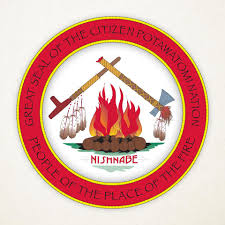
- Details
- By Native News Online Staff
OKLAHOMA, Okla. — Citizen Potawatomi Nation has asked a federal judge to permit it to join the Cherokee, Chickasaw and Choctaw Nations in an existing Federal lawsuit against Oklahoma Governor Kevin Stitt. The lawsuit seeks a judicial declaration that the gaming compacts the tribes have with the state automatically renewed on Jan. 1, 2020.
Citizen Potawatomi Nation requested Timothy D. DeGiusti, chief judge of the U.S. District Court of the Western District of Oklahoma, grant them permission to join the other tribes in the fight against Stitt, who alleges that gaming compacts expired.
Last week, Stitt asked the court to stop American Indian tribes from operating Class III gaming in Oklahoma. Stitt is seeking new compacts with higher exclusivity fees from the tribes, which pay between four and six percent of their gaming revenues to the state.
"To say that the tribes aren't paying their fair share is a misrepresentation of all that we do for Oklahoma. We contribute 100 percent of our tribal revenue to Oklahomans through infrastructure, education, economic development and more," Citizen Potawatomi Nation Tribal Chairman John Barett said.
“We are committed to remaining a strong partner with the State of Oklahoma,” Barrett said. “We do that through our tribal enterprises, which create an economic impact of more than $530 million, and through programs and initiatives that provide healthcare, address infrastructure needs, and fund education.”
The gaming compacts at issue require tribes to pay the state “exclusivity fees” of between 4% and 10% on gambling revenue in exchange for exclusivity rights to operate casinos in Oklahoma. The exclusivity fees paid by tribes generated nearly $139 million for the state last year, with most of it earmarked for education funding.
More Stories Like This
Native News Weekly (August 25, 2024): D.C. BriefsNavajo Nation Mourns the Passing of Former Vice President Rex Lee Jim
Deb Haaland Earns Endorsement From Communications Workers of America Local 7076
University Soccer Standout Leads by Example
Two Native Americans Named to Democratic Congressional Campaign Committee's“Red to Blue” Program
Help us defend tribal sovereignty.
At Native News Online, our mission is rooted in telling the stories that strengthen sovereignty and uplift Indigenous voices — not just at year’s end, but every single day.
Because of your generosity last year, we were able to keep our reporters on the ground in tribal communities, at national gatherings and in the halls of Congress — covering the issues that matter most to Indian Country: sovereignty, culture, education, health and economic opportunity.
That support sustained us through a tough year in 2025. Now, as we look to the year ahead, we need your help right now to ensure warrior journalism remains strong — reporting that defends tribal sovereignty, amplifies Native truth, and holds power accountable.
 The stakes couldn't be higher. Your support keeps Native voices heard, Native stories told and Native sovereignty defended.
The stakes couldn't be higher. Your support keeps Native voices heard, Native stories told and Native sovereignty defended.
Stand with Warrior Journalism today.
Levi Rickert (Potawatomi), Editor & Publisher

